Planep T 20 mg Tablet 10's
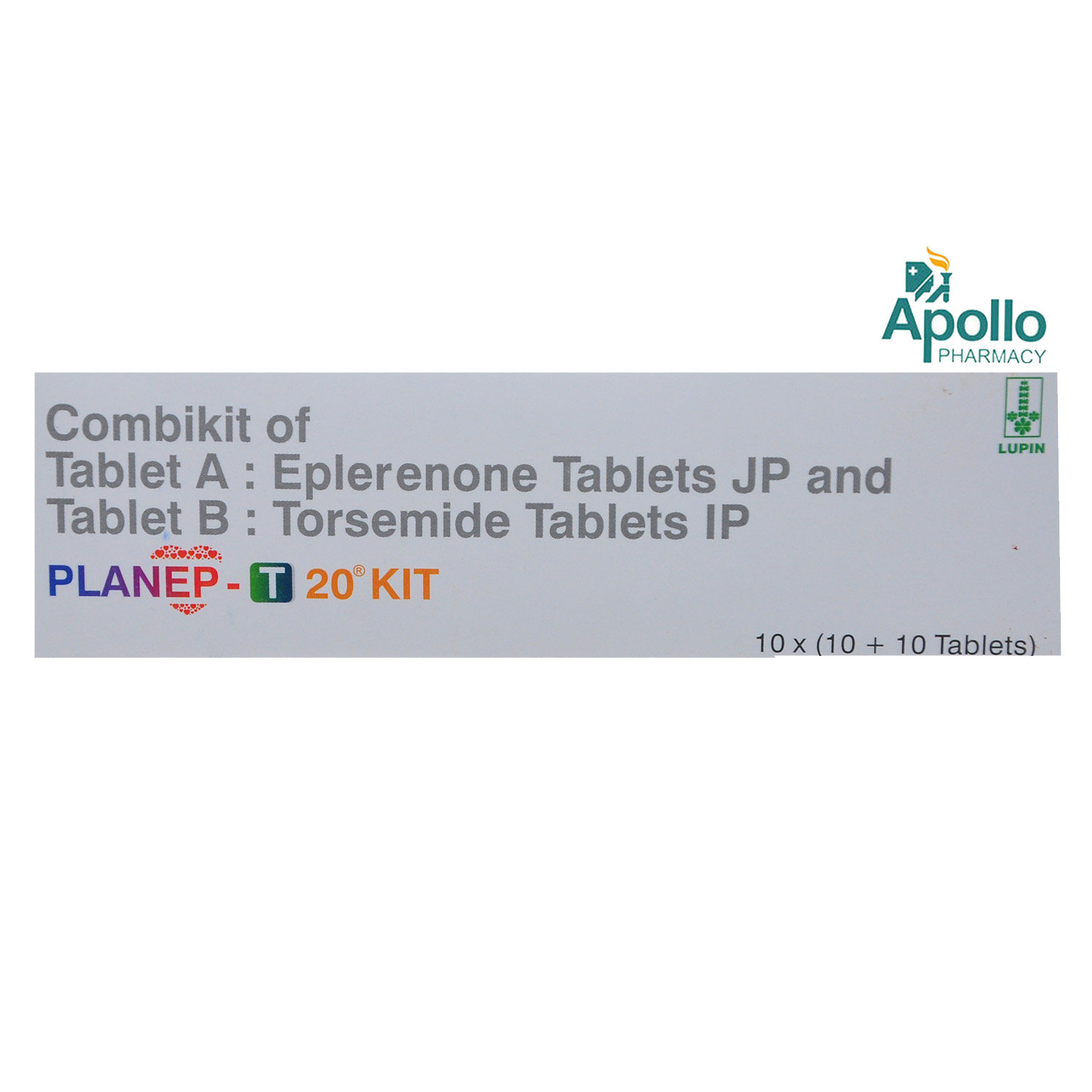
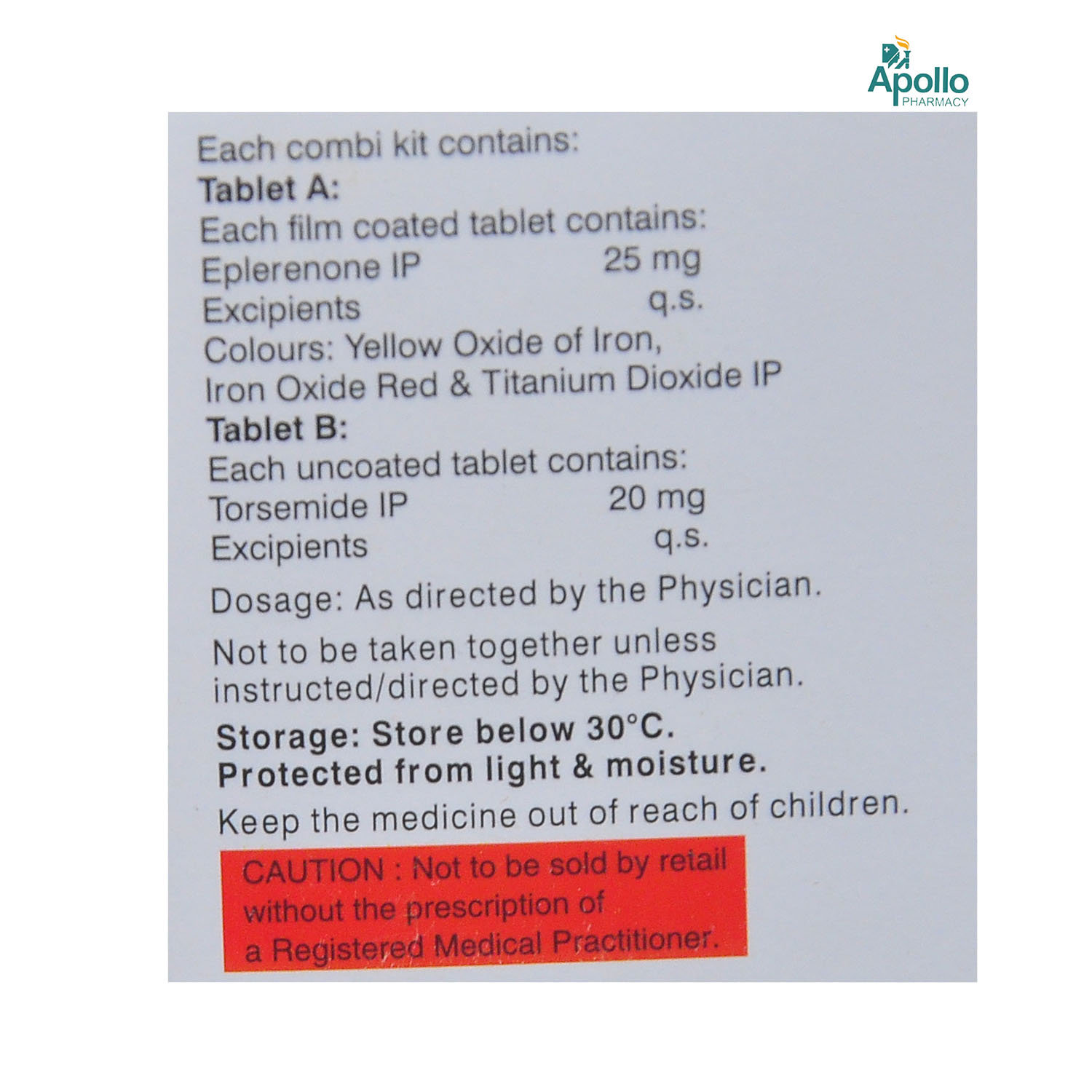
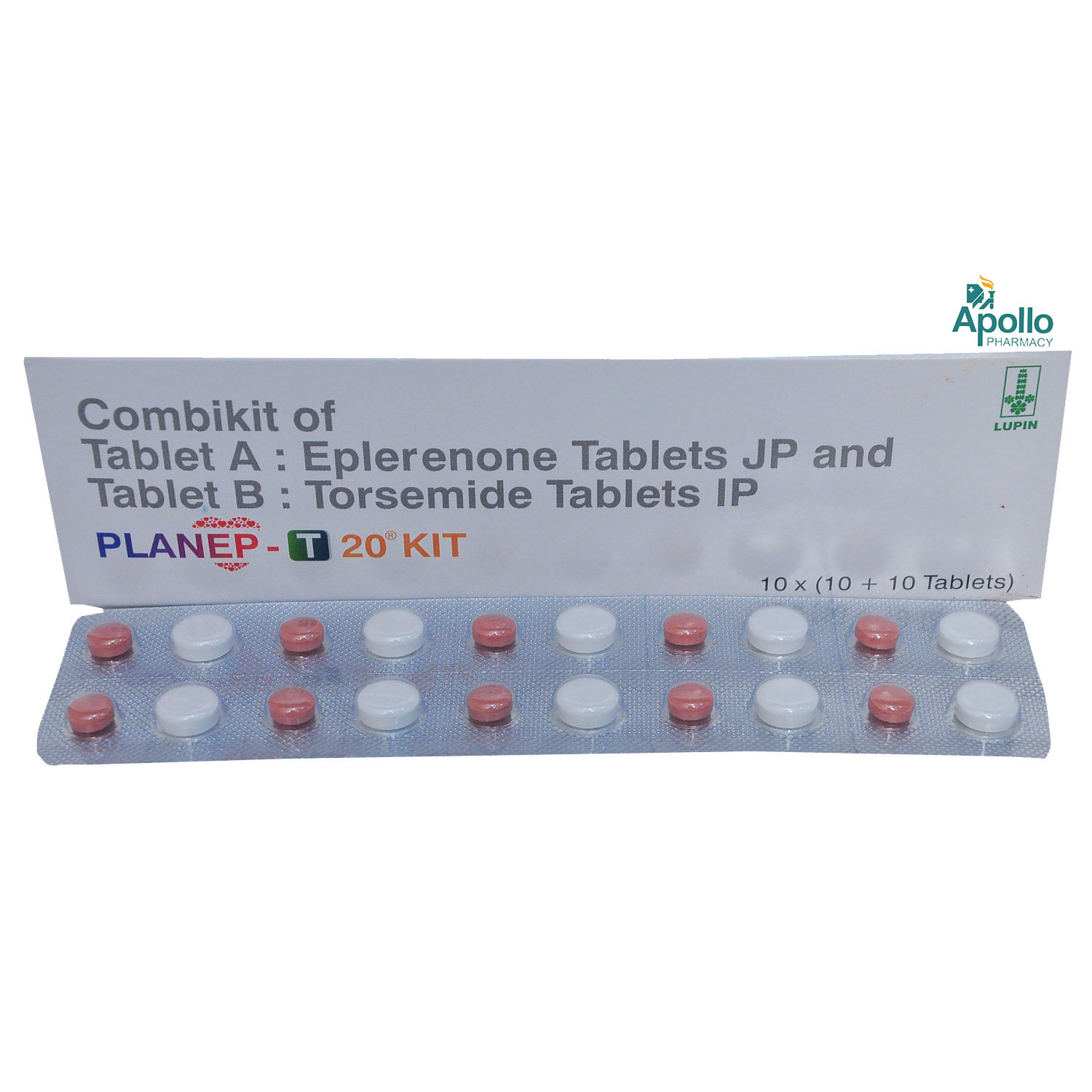
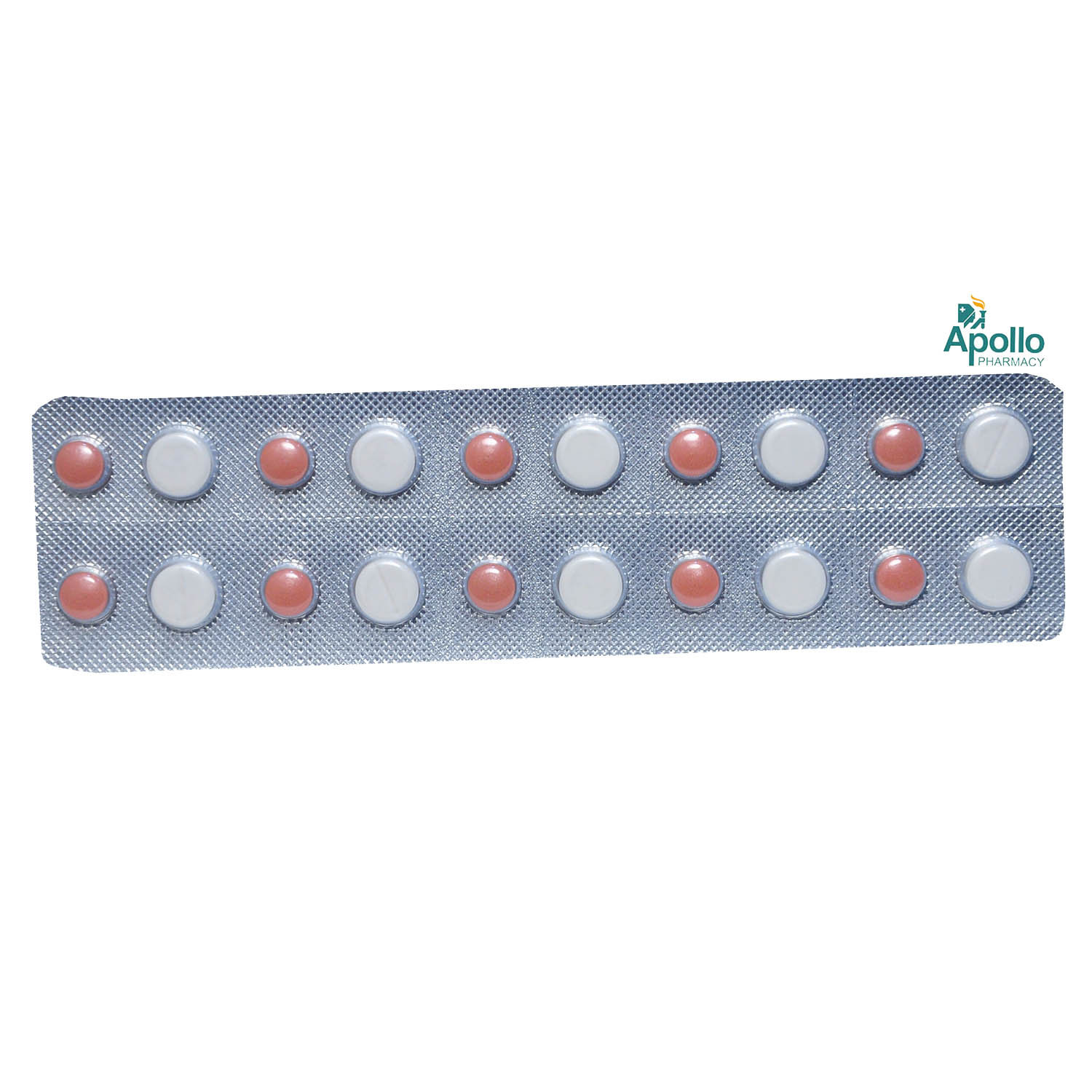
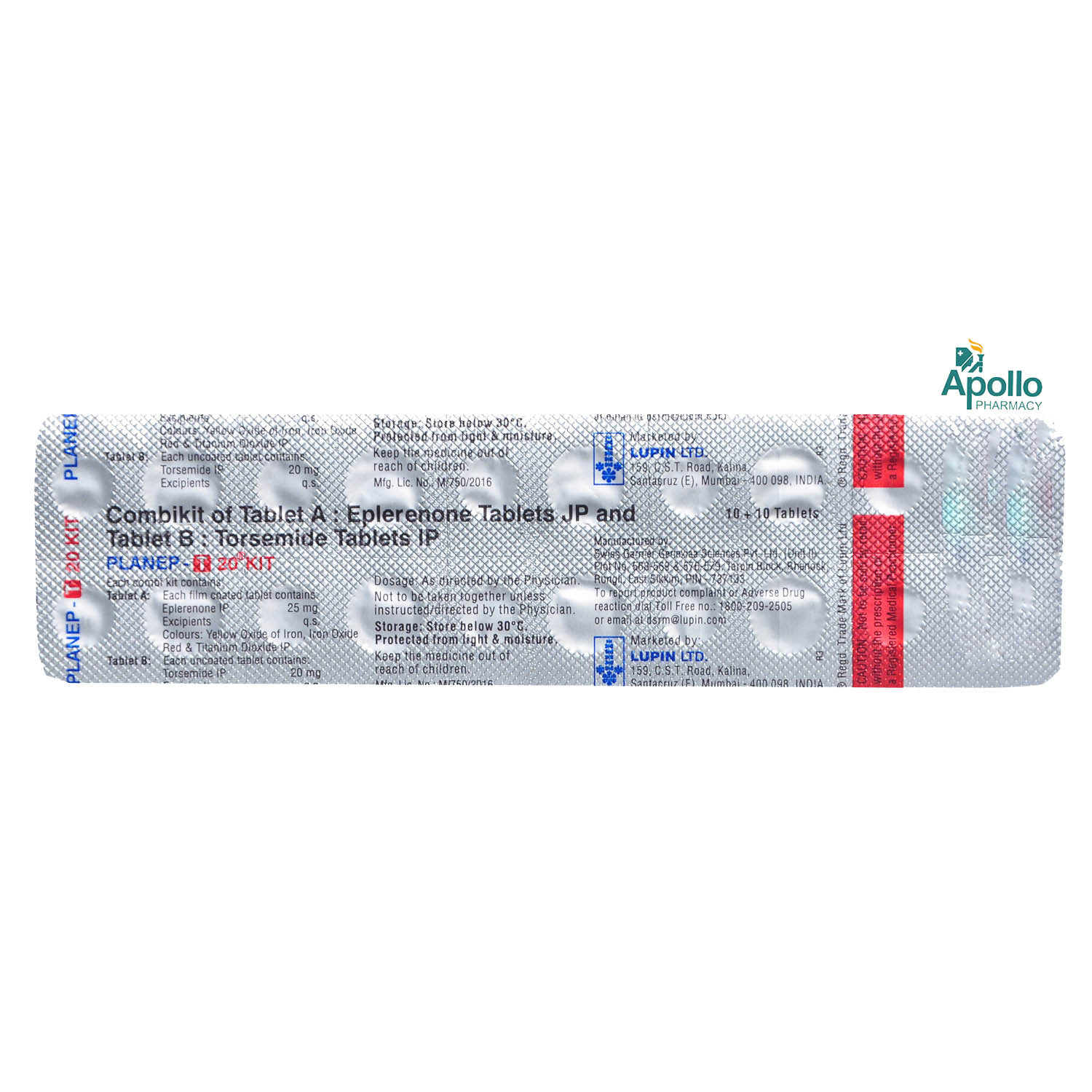
MRP ₹382.5
(Inclusive of all Taxes)
₹57.4 Cashback (15%)
Planep T 20 mg Tablet is used to treat heart failure after a heart attack, high blood pressure, and oedema. It contains Eplerenone and Torasemide, which work by removing excess fluids from the body, enhancing cardiac function, and lowering blood pressure. This medicine may cause side effects like headache, dizziness, diarrhoea, constipation, and nausea. Before starting this medicine, inform your doctor if you are pregnant, breastfeeding, taking any other medicines or have pre-existing medical conditions.
Know Your Delivery Time
Provide Delivery Location

Secure Payment

India's Most Trusted Pharmacy

Genuine Products
Composition :
Manufacturer/Marketer :
Consume Type :
Return Policy :
Expires on or after :
About Planep T 20 mg Tablet
Planep T 20 mg Tablet is used to treat congestive heart failure post-heart attack. Additionally, it is also used to treat oedema (fluid build-up) and hypertension (high blood pressure). High blood pressure is a condition in which the force of blood against the walls of blood vessels is too high.
Planep T 20 mg Tablet contains Eplerenone and Torasemide, which work by removing excess water and certain electrolytes from the body. It also helps maintain potassium levels. Thus, Planep T 20 mg Tablet lowers blood pressure and improves the functioning of the heart.
In some cases, Planep T 20 mg Tablet may cause side effects like headache, dizziness, diarrhoea, constipation, nausea, and excessive urination. Most of these side effects do not require medical attention and resolve over time. However, consult your doctor if the side effects persist or worsen.
Do not take Planep T 20 mg Tablet if you are pregnant or breastfeeding. Consult your doctor if you are pregnant or breastfeeding. Keep your doctor informed if you are taking any other medications and about your medical conditions.
Uses of Planep T 20 mg Tablet
Planep T 20 mg Tablet is used to treat conditions involving fluid retention and high blood pressure. The detailed uses of Planep T 20 mg Tablet are as follows:
- Congestive Heart Failure Post-Myocardial Infarction: Planep T 20 mg Tablet helps improve the survival of stable patients with heart failure post-heart attack.
- Oedema: Planep T 20 mg Tablet reduces swelling and fluid buildup in patients with heart-related conditions.
- Hypertension: Planep T 20 mg Tablet lowers high blood pressure by reducing fluid retention, thereby reducing cardiovascular risk.
- Maintenance of potassium levels: Planep T 20 mg Tablet helps maintain normal potassium levels while promoting fluid loss.

Have a query?
Directions for Use
- Planep T 20 mg Tablet can be taken orally with or without food, or as directed by your physician.
- It is best to avoid taking this medication within 4 hours of your bedtime to prevent having to get up to urinate.
- Swallow the tablet whole with a full glass of water.
- Do not crush, chew, or break it.
Medicinal Benefits
- Planep T 20 mg Tablet helps improve survival in patients with congestive heart failure (CHF) following a myocardial infarction (heart attack).
- It aids in the management of hypertension (high blood pressure) by removing excess fluid and relaxing blood vessels.
- It reduces oedema (fluid retention) associated with heart failure, liver cirrhosis, or pulmonary hypertension.
- Eplerenone helps maintain normal potassium levels in the blood while controlling blood pressure.
- Torasemide promotes the removal of excess salt and water from the body, reducing swelling.
- It helps prevent fluid buildup in the lungs and tissues, improving breathing and comfort.
- Planep T 20 mg Tablet reduces strain on the heart, improving its overall function and efficiency.
- It enhances the quality of life and reduces complications related to fluid overload and high blood pressure.
How Planep T 20 mg Tablet Works
Storage
- Reduce salt intake to minimize fluid buildup.
- Use compression stockings, sleeves, or gloves.
- Gently massage the affected area towards the heart.
- Protect the swollen area from injury and keep it clean.
- Use lotion or cream to keep the skin moisturized.
- Inform Your Doctor: Notify your doctor immediately about your diarrhoea symptoms. This allows them to adjust your medication or provide guidance on managing side effects.
- Stay Hydrated: Drink plenty of fluids to replace lost water and electrolytes. Choose water, clear broth, and electrolyte-rich drinks. Avoid carbonated or caffeinated beverages to effectively rehydrate your body.
- Follow a Bland Diet: Eat easy-to-digest foods to help firm up your stool and settle your stomach. Try incorporating bananas, rice, applesauce, toast, plain crackers, and boiled vegetables into your diet.
- Avoid Trigger Foods: Steer clear of foods that can worsen diarrhoea, such as spicy, fatty, or greasy foods, high-fibre foods, and dairy products (especially if you're lactose intolerant).
- Practice Good Hygiene: Maintain good hygiene to prevent the spread of infection. To stay healthy, wash your hands frequently, clean and disinfect surfaces regularly, and avoid exchanging personal belongings with others.
- Take Anti-Diarrheal Medications: If your doctor advises, anti-diarrheal medications such as loperamide might help manage diarrhoea symptoms. Always follow your doctor's directions.
- Keep track of your diarrhoea symptoms. If they don't get better or worse or are accompanied by severe stomach pain, blood, or dehydration signs (like extreme thirst or dark urine), seek medical help.
- Drink warm fluids such as warm water with honey, broth, soup or herbal tea to soothe sore throat.
- Gargle with warm salt water.
- Suck on lozenges to increase the production of saliva and soothe your throat.
- Use a humidifier to soothe sore throat as it adds moisture to the air and makes breathing easier.
- Take medications with food (if recommended): It can help prevent stomach distress and indigestion.
- Eat smaller, more frequent meals: Divide daily food intake into smaller, more frequent meals to ease digestion.
- Avoid trigger foods: Identify and avoid foods that trigger indigestion, such as spicy, fatty, or acidic foods.
- Stay upright after eating: Sit or stand upright for at least 1-2 hours after eating to prevent stomach acid from flowing into the oesophagus.
- Avoid carbonated drinks: Avoid drinking carbonated beverages, such as soda or beer, which can worsen indigestion.
- Manage stress: To alleviate indigestion, engage in stress-reducing activities like deep breathing exercises or meditation.
- Consult a doctor if needed: If indigestion worsens or persists, consult a healthcare professional to adjust the medication regimen or explore alternative treatments.
- Rest well; get enough sleep.
- Eat a balanced diet and drink enough water.
- Manage stress with yoga and meditation.
- Limit alcohol and caffeine.
- Physical activities like walking or jogging might help boost energy and make you feel less tired.
- Inform your doctor about your constipation symptoms. They may adjust your medication or advise alternative treatments.
- Stay hydrated by drinking sufficient of water (at least 8-10 glasses a day) to help soften stool and promote bowel movements.
- Increase fibre intake by eating foods high in fibre, such as fruits, whole grains, vegetables and legumes, to help bulk up the stool.
- Establish a bowel routine by trying to go to the bathroom at the same time each day to train your bowels.
- Engaging in regular exercise, like walking or yoga, can support in bowel movement stimulation.
- Consult your doctor if constipation persists, and discuss alternative treatments or adjustments to your medication.
- Inform your doctor about dizziness symptoms. They may adjust your medication regimen or prescribe additional medications to manage symptoms.
- Follow your doctor's instructions for taking medication, and take it at the same time every day to minimize dizziness.
- When standing up, do so slowly and carefully to avoid sudden dizziness.
- Avoid making sudden movements, such as turning or bending quickly, which can exacerbate dizziness.
- Drink plenty of water throughout the day to stay hydrated and help alleviate dizziness symptoms.
- If you're feeling dizzy, sit or lie down and rest until the dizziness passes.
- Track when dizziness occurs and any factors that may trigger it, and share this information with your doctor to help manage symptoms.
What if I have taken an overdose of Planep T 20 mg Tablet
Drug Warnings
- Do not take Planep T 20 mg Tablet if you are allergic to any of its components.
- Inform your doctor if you have anuria (lack of urine production), low blood pressure, hepatic coma and precoma, hypovolaemia (low blood volume), diabetes, and heart, kidney or liver problems.
- Consult your doctor if you are pregnant or breastfeeding.
- Planep T 20 mg Tablet is not recommended for use in children.
- Drive only if you are alert, as Planep T 20 mg Tablet may cause dizziness and sleepiness.
- Let your doctor know if you are taking any other medicines, including supplements and herbal products.
Drug-Drug Interactions
Drug-Drug Interactions
Login/Sign Up
Co-administration of Planep T 20 mg Tablet and Clarithromycin may significantly increase the blood levels and effects of Planep T 20 mg Tablet.This may increase the risk or severity of side effects like high blood potassium which can lead to kidney damage and irregular heart rate.
How to manage the interaction:
Taking Clarithromycin with Planep T 20 mg Tablet is not recommended as it can lead to interaction. However, it can be taken if a doctor advises it. If you experience any unusual symptoms like headaches, irritation, confusion, edema (swelling caused by too much fluid accumulation), weakness, palpitations, or constipation, consult a doctor immediately. Do not stop using any medications without the Doctor's advice.
Coadministration of Nefazodone with Planep T 20 mg Tablet can increase the levels of Planep T 20 mg Tablet in the body.
How to manage the interaction:
Taking Nefazodone with Planep T 20 mg Tablet together is not recommended as it can result in an interaction, but it can be taken if your doctor has advised it. However, if you notice any symptoms of headaches, irritation, confusion, edema (swelling caused by too much fluid accumulation), weakness, palpitations, or constipation, you should contact a doctor immediately. Do not stop using any medications without a doctor's advice.
Co-administration of Planep T 20 mg Tablet and Ritonavir may significantly increase the blood levels of Planep T 20 mg Tablet.
How to manage the interaction:
Taking Ritonavir and Planep T 20 mg Tablet together is not recommended as it can lead to an interaction. However, it can be taken if a doctor advises it. If you experience any unusual symptoms like headaches, irritation, confusion, edema (swelling caused by too much fluid accumulation), weakness, palpitations, or constipation, consult a doctor immediately. Do not stop using any medications without a doctor's advice.
Combining Planep T 20 mg Tablet with Potassium iodide may significantly increase potassium levels in the blood which can lead to kidney issues, muscle paralysis (loss of muscle function) and irregular heart rhythm.
How to manage the interaction:
Although there is a possible interaction between Potassium iodide and Planep T 20 mg Tablet, you can take these medicines if prescribed by a doctor. Consult a doctor if you experience nausea, vomiting, weakness, disorientation, tingling in your hands and feet, feelings of heaviness in your legs, a weak pulse, or irregular heartbeat. It is essential to maintain proper fluid intake while taking these medications. Do not discontinue any medications without a doctor's advice.
Co-administration of EPELENONE and SAQUINAVIR may significantly increase the blood levels and side effects of Planep T 20 mg Tablet. This can increase the risk of serious side effects like high blood potassium, which in severe cases can lead to kidney failure, muscle paralysis (loss of muscle function) and irregular heart rhythm.
How to manage the interaction:
Taking saquinavir and Planep T 20 mg Tablet together is not recommended as it can lead to interaction. However, it can be taken if a doctor advises it. If you experience any unusual symptoms like headaches, irritation, confusion, edema (swelling caused by too much fluid accumulation), weakness, palpitations, or constipation, consult a doctor immediately. Do not stop using any medications without the doctor's advice.
Combining Planep T 20 mg Tablet with Spiranolactone may significantly increase potassium levels in the blood which can lead to kidney issues and irregular heart rhythm.
How to manage the interaction:
Although there is a possible interaction between spironolactone and Planep T 20 mg Tablet, it is not recommended as it can lead to an interaction. You can take these medicines if prescribed by a doctor. Consult a doctor if you experience nausea, vomiting, weakness, confusion, tingling in your hands and feet, feelings of heaviness in your legs, a weak pulse, or an irregular heartbeat. It is essential to maintain proper fluid intake while taking these medications. Do not discontinue any medications without a doctor's advice.
Using Planep T 20 mg Tablet together with Potassium chloride may significantly increase potassium levels in the blood.
How to manage the interaction:
Taking potassium chloride with Planep T 20 mg Tablet is not recommended. You can take these medicines if prescribed by a doctor. Consult a doctor if you experience nausea, vomiting, weakness, disorientation, tingling in your hands and feet, feelings of heaviness in your legs, a weak pulse, or an irregular heartbeat, consult the doctor immediately. It is essential to maintain proper fluid intake while taking these medications. Do not discontinue any medications without a doctor's advice.
Taking Planep T 20 mg Tablet with Potassium citrate may significantly increase potassium levels in the blood which can lead to kidney issues, muscle paralysis (loss of muscle function) and irregular heart rhythm.
How to manage the interaction:
Although there is a possible interaction between Potassium citrate and Planep T 20 mg Tablet, you can take these medicines if prescribed by a doctor. Consult a doctor if you experience nausea, vomiting, weakness, disorientation, tingling in your hands and feet, feelings of heaviness in your legs, a weak pulse, or irregular heartbeat. It is essential to maintain proper fluid intake while taking these medications. Do not discontinue any medications without a doctor's advice.
Coadministration of Ketoconazole with Planep T 20 mg Tablet can increase the levels of blood potassium which can lead to kidney damage and irregular heart rate.
How to manage the interaction:
Taking ketoconazole with Planep T 20 mg Tablet is not recommended as it can result in an interaction, but it can be taken if a doctor has advised it. However, if you notice any symptoms of headaches, irritation, confusion, edema (swelling caused by too much fluid accumulation), weakness, palpitations, or constipation, you should contact a doctor immediately. Do not stop using any medications without the doctor's advice.
Coadministration of posaconazole with Planep T 20 mg Tablet can increase the blood levels of Planep T 20 mg Tablet. This can increase the risk of serious side effects, including hyperkalemia (high blood potassium).
How to manage the interaction:
Although there is an interaction between posaconazole and Planep T 20 mg Tablet, it can be taken if a doctor has advised it. However, if you experience any unusual symptoms contact a doctor immediately. Do not discontinue any medications without consulting a doctor.
Drug-Food Interactions
Drug-Food Interactions
Login/Sign Up
Diet & Lifestyle Advise
- Keep your weight under control with a BMI of 19.5-24.9.
- Regular physical activity or exercise for at least 150 minutes per week, or about 30 minutes most days of the week, can help lower your raised blood pressure by about 5 mm of Hg.
- Opt for a diet rich in whole grains, fruits, veggies, and low-fat dairy products.
- Limit your daily sodium chloride (table salt) intake to 2300 mg per day, or less than 1500 mg, which is ideal for most adults.
- If you take alcohol, only one serving for women and two servings for men is advisable.
- Quitting smoking is the best strategy to lower the risk of heart disease.
- Avoid chronic stress, as it can raise your blood pressure. To cope with stress, try to enjoy and spend time with your loved ones and practice mindfulness techniques.
- Monitor your blood pressure daily and immediately contact your doctor if there is excessive fluctuation.
- Try to include heart-healthy foods and drinks rich in omega-3 fatty acids in your daily diet. You can also use low-fat cooking oils like olive oil, soybean oil, canola oil, and coconut oil to lower your elevated blood pressure.
Habit Forming
Therapeutic Class
Planep T 20 mg Tablet Substitute

Alcohol
Caution
Avoid consuming alcohol while on treatment with Planep T 20 mg Tablet as it may lead to serious side effects.
Pregnancy
Caution
Inform your doctor if you are pregnant or suspect pregnancy. Your doctor will weigh the benefits and potential risks before prescribing Planep T 20 mg Tablet .
Breast Feeding
Caution
It is not known if Planep T 20 mg Tablet passes into breastmilk. So, inform your doctor if you are a nursing mother. Your doctor will weigh the benefits and potential risks before prescribing Planep T 20 mg Tablet .
Driving
Caution
Planep T 20 mg Tablet may cause dizziness and sleepiness. Drive only if you are alert.
Liver
Caution
Planep T 20 mg Tablet to be taken with caution, especially if you have a history of liver diseases. Your doctor may adjust the dose depending on your current liver conditions.
Kidney
Caution
Planep T 20 mg Tablet to be taken with caution, especially if you have a history of kidney diseases. Your doctor may adjust the dose depending on your current kidney conditions.
Children
Unsafe
Planep T 20 mg Tablet is not recommended for children below 12 years of age.
Heart
Caution
Planep T 20 mg Tablet should be taken with caution in patients with heart problems. Therefore, please inform your doctor before using Planep T 20 mg Tablet .
Geriatrics
Consult your doctor
Limited information available about the use of Planep T 20 mg Tablet in geriatric patients. Please consult your physician.
FAQs
Planep T 20 mg Tablet is used to treat heart failure after a heart attack, high blood pressure, and oedema (fluid build-up).
Planep T 20 mg Tablet contains Eplerenone and Torasemide. Eplerenone blocks the hormone aldosterone, preventing fluid retention and maintaining potassium levels. Torasemide removes excess water and salt from the body, reducing swelling and fluid overload. Together, they improve heart function, reduce oedema, and help control blood pressure.
The main side effect of Planep T 20 mg Tablet is peeing (urination) more often than usual. Most people need to pee about 30 minutes after taking Planep T 20 mg Tablet and again within a few hours. Do not take Planep T 20 mg Tablet before going to bed, or you may have to wake up in the night to go for urination frequently.
Yes, Planep T 20 mg Tablet is known to cause dehydration (excessive loss of fluids). The patient may experience dry mouth, decreased urine output, excessive thirst, and hypotension (decreased blood pressure). Please increase fluid intake to avoid excessive dehydration.
Yes, Planep T 20 mg Tablet can cause increased potassium levels (hyperkalemia), especially in patients with kidney problems or if you are taking potassium supplements along with Planep T 20 mg Tablet . Please monitor your electrolyte level regularly to avoid increasing blood potassium levels.
Yes, Planep T 20 mg Tablet may occasionally cause dizziness due to orthostatic hypotension (sudden drop in blood pressure when standing from a lying position) or passing out. To lower the chance of feeling dizzy or passing out, rise slowly if you have been sitting or lying down.
Planep T 20 mg Tablet may cause side effects like headache, dizziness, diarrhoea, constipation, nausea, and excessive urination. Most of these side effects do not require medical attention and resolve over time. However, consult your doctor if the side effects persist or worsen.
Planep T 20 mg Tablet may increase creatinine levels by affecting kidney function. Therefore, consult a doctor before taking this medication; it’s important to monitor kidney function regularly while using these medications.
When taking Planep T 20 mg Tablet , it's essential to follow certain precautions. If you have kidney problems, your doctor may need to adjust your dose. Additionally, monitor your potassium levels, as Planep T 20 mg Tablet can increase potassium levels in the blood. Inform your doctor about your medications, supplements, and vitamins to avoid potential interactions. Consult your doctor before taking Planep T 20 mg Tablet if you are pregnant, breastfeeding, or planning to become pregnant. Be sure to follow your doctor's instructions for dosage and attend all scheduled follow-up appointments. Immediately report any signs of hyperkalemia (high potassium levels) or other adverse reactions to your doctor. Your doctor may periodically check your kidney function, blood pressure, and potassium levels while taking Planep T 20 mg Tablet .
Planep T 20 mg Tablet should not be used during pregnancy unless absolutely necessary. Therefore, consult a doctor if you are pregnant. Before prescribing this medication, your doctor will carefully assess the benefits and potential risks.
Planep T 20 mg Tablet may cause constipation as a common side effect. If you experience this symptom, drink plenty of water to stay hydrated, eat a fibre-rich diet, exercise regularly, and limit caffeine intake.
Planep T 20 mg Tablet should be used with caution in patients with kidney problems. If you have a history of kidney disease, consult your doctor before taking Planep T 20 mg Tablet . Your doctor may need to adjust your dose depending on your current kidney condition.
Country of origin
Manufacturer/Marketer address
Customers Also Bought
Disclaimer
Author Details
We provide you with authentic, trustworthy and relevant information
Buy best Cardiology products by
Torrent Pharmaceuticals Ltd
Lupin Ltd
Sun Pharmaceutical Industries Ltd
Intas Pharmaceuticals Ltd
Cipla Ltd
Micro Labs Ltd
Abbott India Ltd
Macleods Pharmaceuticals Ltd
Ajanta Pharma Ltd
Ipca Laboratories Ltd
Eris Life Sciences Ltd
Mankind Pharma Pvt Ltd
Lloyd Healthcare Pvt Ltd
Dr Reddy's Laboratories Ltd
Emcure Pharmaceuticals Ltd
Alembic Pharmaceuticals Ltd
Glenmark Pharmaceuticals Ltd
Alkem Laboratories Ltd
East West Pharma India Pvt Ltd
Zydus Healthcare Ltd
USV Pvt Ltd
Aristo Pharmaceuticals Pvt Ltd
Alteus Biogenics Pvt Ltd
J B Chemicals & Pharmaceuticals Ltd
Elbrit Life Sciences Pvt Ltd
Fusion Health Care Pvt Ltd
Zydus Cadila
La Renon Healthcare Pvt Ltd
Eswar Therapeutics Pvt Ltd
Akumentis Healthcare Ltd
Hbc Life Sciences Pvt Ltd
Troikaa Pharmaceuticals Ltd
Corona Remedies Pvt Ltd
Knoll Healthcare Pvt Ltd
Medley Pharmaceuticals Ltd
Lividus Pharmaceuticals Pvt Ltd
Morepen Laboratories Ltd
Shrrishti Health Care Products Pvt Ltd
Jubilant Lifesciences Ltd
Msn Laboratories Pvt Ltd
Prevego Healthcare & Research Pvt Ltd
Zuventus Healthcare Ltd
Cadila Pharmaceuticals Ltd
Ranmarc Labs
Steris Healthcare
Unison Pharmaceuticals Pvt Ltd
Blue Cross Laboratories Pvt Ltd
Elder Pharmaceuticals Ltd
Primus Remedies Pvt Ltd
Leeford Healthcare Ltd
Tas Med India Pvt Ltd
Sanofi India Ltd
Azkka Pharmaceuticals Pvt Ltd
Nirvana India Pvt Ltd
Knoll Pharmaceuticals Ltd
Sinsan Pharmaceuticals Pvt Ltd
Systopic Laboratories Pvt Ltd
Indiabulls Pharmaceuticals Pvt Ltd
Orsim Pharma
RPG Life Sciences Ltd
Vasu Organics Pvt Ltd
Biochem Pharmaceutical Industries Ltd
Cadila Healthcare Ltd
Econ Healthcare
Johnlee Pharmaceuticals Pvt Ltd
Shine Pharmaceuticals Ltd
Elinor Pharmaceuticals (P) Ltd
Sunij Pharma Pvt Ltd
Xemex Life Sciences
Olcare Laboratories Pvt Ltd
Orris Pharmaceuticals
Elicad Pharmaceuticals Pvt Ltd
FDC Ltd
Lia Life Sciences Pvt Ltd
MEDICAMEN BIOTECH LTD
Nicholas Piramal India Ltd
Pfizer Ltd
Astra Zeneca Pharma India Ltd
Lakshya Life Sciences Pvt Ltd
Opsis Care Lifesciences Pvt Ltd
Atos Lifesciences Pvt Ltd
Biocon Ltd
Finecure Pharmaceuticals Ltd
Glynis Pharmaceuticals Pvt Ltd
Indoco Remedies Ltd
Acmedix Pharma Llp
Med Manor Organics Pvt Ltd
Pficus De Med Pvt Ltd
Proqol Health Care Pvt Ltd
Divine Savior Pvt Ltd
Enovus Healthcare Pvt Ltd
Samarth Life Sciences Pvt Ltd
ALICAN PHARMACEUTICAL PVT LTD
Alvio Pharmaceuticals Pvt Ltd
Chemo Healthcare Pvt Ltd
Maxford Labs Pvt Ltd
Merck Ltd
Signova Pharma
Wockhardt Ltd
Auspharma Pvt Ltd
Recommended for a 30-day course: 3 Strips







